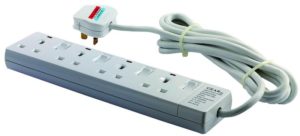Australian Electrical System
The standard voltage for electrical appliances in Australia is 240 volts and 50Hz, basically the same as in the UK.
The electric plugs are different in that they have 3 flat, but angled pins so you may initially need adaptor’s, or arrange to “very quickly” change the plugs when you arrive.
Bring a few power boards, 4 or 6 socket, and just change the one plug to an Australian one, or use one plug adapter, to get you by until you get settled.
Electricity supply in the UK
Normal Household Electricity is: 240 volts, 50 Hz, 13 amps max.
The normal electricity system frequency in the UK is 50Hz.
The National Grid has statutory obligations to maintain the frequency within +/- 0.5Hz around this level. www.nationalgrid.com/uk
In the UK, the average voltage supplied from the national grid is 242V. PDF doc – Click here for link
Electricity supply in Australia
Normal Household Electricity is: 240 volts, 50 Hz, 10 amps max.
The normal mains voltage in Australia is 240 volts, but this can vary between 216 and 254 volts depending on time and load conditions in the distribution system.
The normal maximum current capacity is 10 Amps, but 15 and 20 Amp plug and socket combinations are available, when used with appropriately rated sub-circuits.
The operating frequency is 50 Hertz www.acma.gov.au
It is very common for new migrants to bring a few British 4 or 6 gang extensions, and change the single plugs on those, to an Australian one, to start of with.
Australian Plugs do NOT have fuses, but are limited to a 10 Amp supply.
 << A standard 10 Amp Electric Household Socket.
<< A standard 10 Amp Electric Household Socket.
And a UK one for comparison >> 
Are you allowed to rewire an Australian electrical appliance plug yourself ?
I think the answer will depend on where in Australia you live. However almost all plugs purchased will state, on the packaging, that you have to get an Authorised Electrician to fit them,
Australian Capital Territory
No data yet
New South Wales
WorkCover NSW publication 323 states the following in regard to the replacement of plugs and sockets:
Replacement of plugs and sockets:
Plugs and extension cord sockets may be replaced by a non-electrically trained person provided that the person has been trained and found competent to fit the plugs and sockets according to the manufacturer’s instructions.
PDF File at:www.mbansw.asn.au/…/Sept_Dec_07.pdf
Northern Territory
No data yet
Queensland
Electrical work around the home.
Only a licensed electrician or electrical contractor can do electrical work in your home in Queensland.
You may purchase but cannot install electrical accessories (e.g. junction boxes, light switches, plugs, power points, light fittings without a cord) or fixed wire electrical appliances (ceiling fans, some light fittings, stoves, ovens, split system air conditioning).
Source: www.deir.qld.gov.au/…/index.htm
Electrical Dictionary source:
www.deir.qld.gov.au/…/index.htm
“competent person” means a person who has acquired, through training, qualifications, experience or a combination of these, the knowledge and skill enabling the person to inspect and test electrical equipment.
“fixed electrical equipment” means electrical equipment that is a permanent part of the workplace, such as poles, switchboards, wiring, power points, and other equipment that cannot be unplugged.
Please note an item of electrical equipment connected to electricity by a plug and socket outlet is not permanently electrically connected.
South Australia
No data yet
Tasmania
No data yet
Victoria
No data yet
Western Australia
This information, at www.commerce.wa.gov.au does say: “Although it is legal to connect your own plugs to flexible cords, a faulty connection can kill.”
